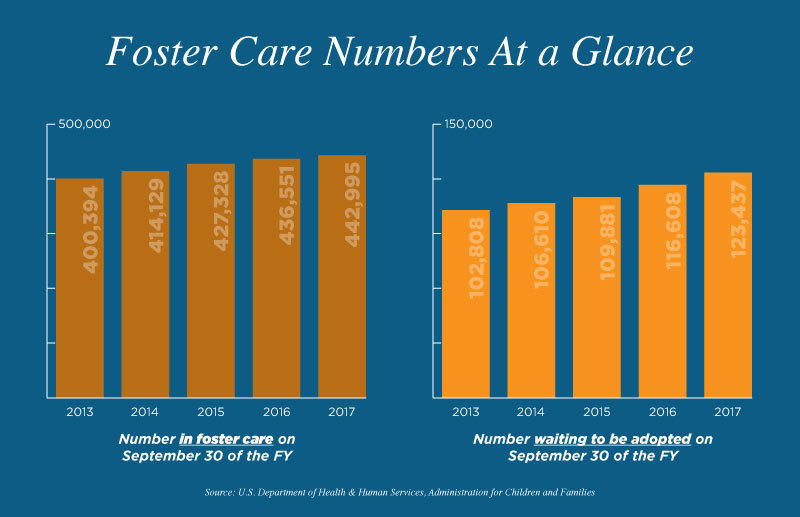
There were about 391,000 children in foster care in 2022, according to the U.S. Department of Health & Human Services. Nearly one-third of those children were waiting to be adopted.
Unfortunately, the foster care system needs help, according to Dr. Anne Adcock, director of the BSW program and associate professor of social work at Campbellsville University. Some people get into fostering for the wrong reasons and assume they’ll be able to live off the money they receive as a stipend for the child in foster care.
Fortunately, social workers in foster care can help. According to the National Association of Social Work (NASW), social workers play a critical role in child welfare systems, and studies point to social workers’ education linking to better outcomes for children and families. “The foster care system is not perfect, but social workers are there to make it as good as it can be,” Adcock said. How does that happen in roles like the foster care social worker? In an interview, Adcock shared details on job responsibilities and the impact that social workers in foster care have.

How Foster Care Social Workers Help Children and Families
Social workers in foster care are often employed by private agencies that have contracts with the state, Adcock explained. The agencies have a number of foster care families who are considered when it’s time to place children into homes.
Foster care agencies employ social workers who work as therapists for children and those who work as case managers. Case managers, who are also known as foster care social workers, take care of responsibilities like assessing families for suitability, placing children and monitoring children. Regular contact is often made with the family about two to four times a month.
There are two crucial tasks that encompass how foster care social workers help children and families. “Mainly, the social worker’s role in the foster care system is to make the connections between the family and the kids,” Adcock said. “And then to monitor those relationships to make sure the child is getting what they need and the foster parents are managing that situation well.”
Making Connections
Building connections with foster care children and potential families is vital for creating a successful placement. Social workers in foster care must take care in choosing the right home for kids in foster care.
Once children are removed from their homes by Child Protective Services, according to Adcock, they receive a social worker either through the state or the state will contract out with an agency to provide a social worker. The social worker will begin the process of securing a long-term foster home placement for the child.
Some children entering foster care need specific accommodations for social or physical needs, such as behavior disorders or disabilities. In these cases, social workers focus on placement in therapeutic foster homes. Those homes and parents can accept children who need special attention. If that scenario unfolds, social workers will need to work on connecting children with the right therapeutic home. There’s a lot of linking required to find the right environment for those children.
Earn your Social Work degree online!
An online BSW can allow you to become a foster care social worker. You’ll develop an understanding of social work while gaining hands-on, practical experience in the field.
Explore DegreeMonitoring Relationships
Once a placement is made, foster care social workers will monitor the child’s relationships. Regular contact is maintained with at least two in-home visits per month and other check-ins by phone.
If help is needed, social workers can step in and respond accordingly. “As a crisis comes up on the part of either the parent or the child, they go and take care of those things,” Adcock said. From crisis prevention and response to providing other types of support, there are a number of ways foster care social workers monitor cases.
- Emotional Support: Foster care children need emotional and behavioral support. “Most of the time these kids also have a therapist,” Adcock said. “The case manager and the therapist kind of work as a team. So, if there are things that the case manager sees that need to be discussed in therapy, they can communicate that to the therapist.” The foster care social worker can also talk with children in general about their concerns and fears, or anything else on their mind. Another way social workers in foster care provide emotional support is by accompanying children at family court. That enables children to receive some help navigating the court system.
- Financial Support: If children have extra needs that go beyond the monthly stipend parents receive for food, clothing and basic necessities, social workers will ensure they receive what they need.
- Mediation and Crisis Intervention: Some situations can be difficult to deal with. “A lot of these kids have trauma in their past,” Adcock said. “They have abuse in their past. It’s not uncommon for a foster child to have significant behavior problems . . . Sometimes they will run away from the foster care home. I know I had a former student that was in a foster care agency, and the kid just took off.” The social worker in that case was out with the police helping look for the child. In other instances, such as when foster parents have proven to be inadequate, the social worker may need to correct the situation or remove the child from the foster home.
- Respite Care: Parents can request respite care for circumstances when they cannot care for foster children. For example, if a parent has surgery or an out-of-town family reunion, there are respite homes social workers can locate to take children for a few days.
The Rewarding Nature of Working in Foster Care
There are some tough times for social workers in foster care, but that’s not always the case. “Overall, it’s rewarding, because they get connected to the kids and the kids rely on them,” Adcock said. “Sometimes they’re the only one that the kid trusts, and that’s a good thing.”
There are times that demonstrate why foster care social workers dedicate their lives to helping children and families. “If everything goes well, they’re (reunited) with their original family,” Adcock said. “The best times, I think, for a lot of my former students . . . is when an adoption goes through. When the foster care family is the right fit, everybody’s happy, and it moves forward to adoption . . . I think those are the best days.”
Another great part of social work is that there’s always room to move up. Foster care social workers, or case managers, can earn their master’s degree and become a therapist. That enables them to have some variety while staying in the foster care specialty.
Career Information for Foster Care Social Workers
Salary and Job Outlook
According to the Bureau of Labor Statistics (BLS), social workers earned a median annual wage of $55,350 in 2022. Starting salaries are typically lower, according to Adcock, but there is significant earning potential for a BSW-trained social worker who moves forward to earn a Master of Social Work. “Typically, there’s a $10,000 to $15,000 salary difference right off the bat, depending on where you are.”
Employment for all social workers is projected to grow 7 percent by 2032, according to the BLS, which is faster than average growth for all occupations. According to Adcock, there is a special need for social workers in foster care. Private foster care agencies are always hiring, given the demand that has resulted from states contracting their work to those agencies. Adcock said many foster care agencies are also expanding services to provide addiction treatment for juveniles.
Educational Requirements
The BLS noted that social workers need a bachelor’s degree. Providing counseling services as a clinical social worker requires a master’s degree in social work.
An online bachelor’s degree in social work can allow you to become a foster care social worker. You’ll develop an understanding of the basics of social work while gaining, hands-on, practical experience in the field. There’s also a course, “Foster Care & Adoption,” that covers the foster care specialty.
Campbellsville University’s program lets you study in a convenient, flexible environment. Gain the skills and knowledge needed to become a social worker at an institution ranked among the most affordable Christian colleges in the United States. The program is accredited by the Council on Social Work Education.
